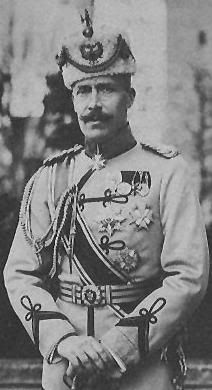Wilhelm I, Prince of Albania
From Kaiserreich

|
Wilhelm zu Wied (also known as Skanderbeg II, born Wilhelm Friedrich Heinrich in Neuwied, Germany on March, 26 1876) is the current Prince of Albania, since the title was officially created on February, 21 1914. He officiously reigned over Albania shortly before the Weltkrieg and returned and remained there under Ottoman guarantee.
Contents |
Biography
Early life
The third son of Wilhelm, 5th Prince of Wied and Princess Marie of the Netherlands, Prince Wilhelm had joined the Prussian army and served in the cavalry before becoming a captain in the General Staff in 1911. When she learnt that the Great Powers were searching a prince to rule the newly independant Albania, Queen Elisabeth of Romania eventually asked them to choose her nephew, Prince Wilhelm, for the post. In November 1913, Austria-Hungary, the United Kingdom, France, Germany, Russia and Italy issued an announcement where they announced they had selected the German prince to rule the little country, a decision that was accepted by Ismail Qemali, head of the Provisional Government. The offer of the Albanian throne had already been made to Wilhelm during the spring 1913 but he had turned it down: he finally accepted on February, 7 1914, under Austrian pressure.
Reign
On February, 21 1914 a delegation of Albanian notables made a formal request, which Wilhelm accepted thereby becoming the Prince of Albania. One month after accepting the throne on March, 7 he arrived in his provisional capital of Durrës and started to organise his government, appointing Turhan Pasha Përmeti to form the first Albanian cabinet. Immediately following his arrival revolts broke out in central Albania against his Chief Minister, Essad Pasha, and against foreign domination. Greece encouraged the formation of "provisional government of North Epirus". Although an agreement was made to grant extra rights to the Greek minority, the Hellenic Army occupied Southern Albania excluding Berat and Korçë. Wilhelm's position was also undermined by own officials, notably Essad Pasha himself, who accepted money from Italy to finance a revolt and to stage a coup against Wilhelm. Pasha was arrested on May 19, 1914 and tried for treason and sentenced to death. Only the intervention of Italy saved his life and he escaped to Italy in exile.
The outbreak of the Weltkrieg presented more problems for Prince Wilhelm as Austria-Hungary demanded that he send Albanian soldiers to fight alongside them. When he refused, citing the neutrality of Albania in the Treaty of London, the remuneration that he had been receiving was cut off. His regime collapsed, and so Prince Wilhelm left the country on September 3, 1914 originally heading to Venice. Despite leaving Albania he did so insisting that he remained head of state.He returned to Germany and rejoined the Imperial German Army under the pseudonym "Count of Kruja",a name derived from the city of Krujë in Albania. When the Austro-Hungarians forced the Serbian] and Montenegrian armies out of Northern Albania in the early months of 1916, Wilhelm's hopes of being restored were raised. On 1921, the Peace with Honour officially determined the status of Albania: a restored principality under the authority of the Prince Wilhelm, but under Austrian influence anymore, but as a formal vassal of the Ottoman caliph. Prince Wilhelm accepted, and returned to his throne in the new capital, Tirana. Even if revolts continued to broke out during his reign, he was now helped by Ottoman support, which also slightly controlling the country's inner politics, such as forcing the Prince to appoint the very ambitious Ahmet Zogu as his Prime Minister.
Family
Prince Wilhelm married Princess Sophie von Schönburg-Waldenburg (born May, 21 1885), daughter of Hereditary Prince Victor von Schönburg-Waldenburg, on November, 30 1906. They had two children together:
- Princess Marie Eleonore (born 1909)
- Hereditary Prince Carol Victor (born 1913)
Title controversy
Since 1914, the official title of Prince Wilhelm is By the grace of the powers and the will of the people the Mbret of Albania. The point was that "mbret" is the Albanian word for "king", therefore giving him a title superior to prince. Although he is referred diplomatically as Sovereign Prince, the King of neighbouring Montenegro felt it as an insult, and Albanians as a way to claim their full independance. As Montenegro ceased to exist, annexed by Austria-Hungary, the controversy ceased, as even as a King, the Prince of Albania remains vassal to the Ottoman Caliph: therefore, Prime Minister Ahmet Zogu proposed to officially create the title of King of Albania. The title of King of Albania had already been carried by the Angevin kings of Naples during the Middle Ages. Prince Wilhelm also chose the Albanian regnal name of Skanderbeg II as a tribute to the Albanian national hero.
